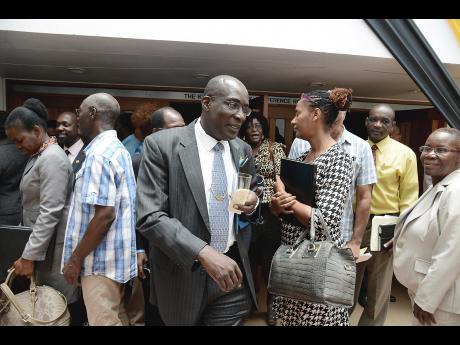Principals on board - school leaders express change of heart over proposed fee structure
Having been provided with clarification on the Government's plan to remove auxiliary fees, principals and school leaders are now on board with the plan, expressing relief that they will not be left to suffer.
In fact, they say that with the proposal by the ministry to increase the allocation of funds to each school, they can now be confident of a 100 per cent compliance rate. Under the outgoing auxiliary fee system, the compliance rate was below 50 per cent as several parents did not pay the fee.
Yesterday, Minister of Education Ruel Reid met with school leaders, including principals, bursars, and board chairmen, at the Jamaica Conference Centre in Kingston to discuss and clarify the Government's new tuition fee policy. This will see parents no longer paying auxiliary fees, while, at the same time, the Government plans to increase the tuition contribution per student from $11,500 to $19,000.
However, Reid pointed out that the increase would not be applied across the board, but would be done on a case by case basis as not all schools face the same challenges and have the same needs.
NO STRAIGHTLINE FUNDING
"We are not offering a straightline funding to schools because some schools already have additional resources, while others are underserved. So, what we are going to do is a flexible contribution from Government, looking at the particular needs of each school and providing the support accordingly," he said.
With auxiliary fees ranging from $5,000 to $47,000, Reid said many parents could not afford to pay, hence the need for the Government to revise the tuition policy. "The compliance rate for the payment of auxiliary fees is 49 per cent, and this has been on the decline since 2011," he said.
Reid asked that parents who can afford to pay continue to contribute to the development of their children's schools.
"This new tuition fee policy is not banning the collection of funds from parents. As a matter of fact, parents are being encouraged to support their school. However, schools must make a distinction between tuition fees and contributions by parents," he said.
SIGH OF RELIEF
Linton Weir, president of the Association of Principals and Vice-principals, told the media conference that: "Before this discussion, many of us were not sure where we were going in terms of the different fees and fee structures. However, now that we have had this meeting and greater light has been shed, school leaders will now be able to breathe a sigh of relief in moving forward as it relates to the development of our schools."
He said the plan by the Government to increase the per-student allocation was significant as, for many years, there was no increase.
In addition to the increase in tuition subventions to schools, the ministry has also set aside funds in the capital budget to support building and maintenance projects.
Daniel Morgan, principal of Pembroke Hall High, told The Gleaner: "My compliance rate (for auxiliary fees from parents) is less than 35 per cent, so we are inadequately funded, and with this proposal, I think we will be far better off than we were."
Jonathan Grant High's principal O'Neil Ankle said: "Currently, we ask for $18,000 in auxiliary fees, but a very low percentage of the parents pay. If I can get, say $19,000 for each student from the ministry, it would be like I am getting 100 per cent compliance rate. If they stay true to their words and supply the money, I believe it can really work, but if they don't, there will be a major shortfall."

